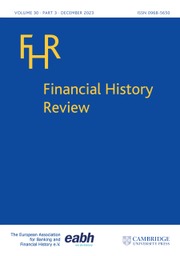Article contents
International credit market integration in northwestern Europe in the 1670s
Published online by Cambridge University Press: 06 June 2019
Abstract
This article studies the financial market integration in the 1670s by examining the effectiveness of triangular exchange arbitrage. The results suggest that international credit markets based on bills of exchange in northwestern Europe were well integrated and responded to exchange-rate differences quickly. The speed of adjustment, ranging between one and three weeks, accorded with the speed of communication, but the transaction cost associated with exchange arbitrage was much lower than that of shipping bullion. Although warfare had a disruptive effect on exchange arbitrage by increasing transaction cost, markets were resilient in remaining efficient.
Keywords
- Type
- Articles
- Information
- Copyright
- Copyright © European Association for Banking and Financial History e.V. 2019
Footnotes
I would like to thank Oliver Volckart, Patrick Wallis, Jui-Chung Yang, the editor Rui Esteves and two anonymous referees for their invaluable comments and suggestions in the preparation of this article. The errors that remain are, of course, my own responsibility.
References
- 1
- Cited by


